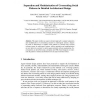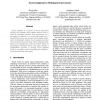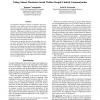173 search results - page 2 / 35 » Society-Centered Design for Socially Embedded Multiagent Sys... |
CAISE
2006
Springer
13 years 9 months ago
2006
Springer
This paper outlines an aspect-oriented approach to support separation and modularization of crosscutting concerns in multi-agent systems. Aspects as abstractions to capture social ...
ATAL
2004
Springer
13 years 10 months ago
2004
Springer
Social judgment is a process of social explanation whereby one identifies which entities deserve credit or blame for multiagent activities. Such explanations are a key aspect of i...
KI
1998
Springer
13 years 9 months ago
1998
Springer
Abstract. In Distributed Problem-solving (DPS) systems a group of purposefully designed computational agents interact and co-ordinate their activities so as to jointly achieve a gl...
AAAI
2010
13 years 6 months ago
2010
In cooperative multiagent systems an alternative that maximizes the social welfare--the sum of utilities--can only be selected if each agent reports its full utility function. Thi...
DFKI
2005
Springer
13 years 7 months ago
2005
Springer
It is widely accepted in Distributed Artificial Intelligence that a crucial property of artificial agents is their autonomy. Whereas agent autonomy enables features of agent-base...



